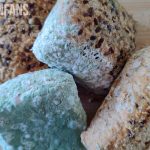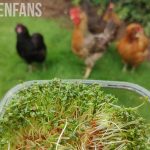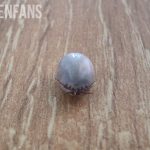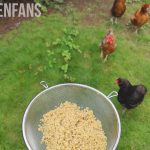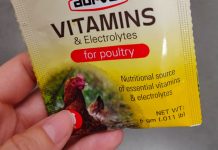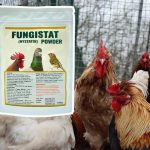Can Chickens Eat Zucchini? The 5 Health Benefits of Courgettes
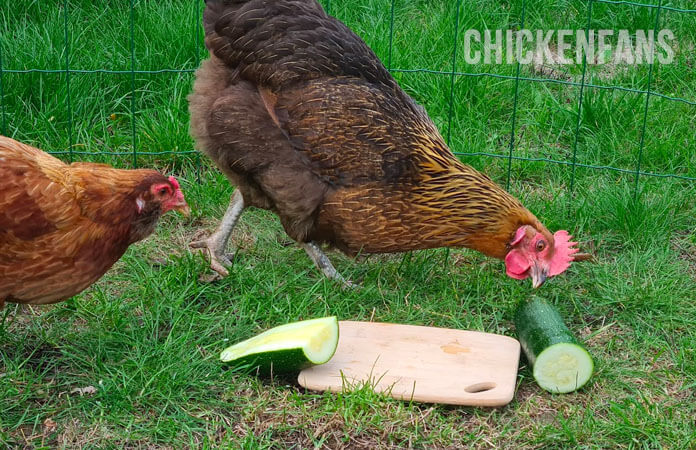
Nutritional Value | Health Benefits | Amount | Leaves | Flowers | FAQ
Zucchinis or courgettes are popular table scraps that frequently end up in the chicken run. It’s a healthy Italian vegetable that’s part of many traditional cuisines. Chickens can eat every part of zucchini, and it’s a very healthy food source for them.
Key Takeaways:
- Chickens can eat zucchini, peels, and seeds
- The best is to cut them in half to feed your flock
- Zucchinis are rich in vitamins A, C, and B6
- Chickens can eat the zucchini flowers and leaves
- Zucchinis are ideal for hydration and body temperature control
Let’s start with the most important question:
Can Chickens Eat Zucchini?
Yes, chickens can eat zucchini, zucchini peels, and zucchini seeds. You can safely feed them table scraps, as zucchini are a healthy food source rich in minerals and vitamins A, C, and B6. Zucchini can keep your chickens hydrated, boost their immune system, and helps your flock see in dim lights.
The best way is to cut the zucchini in half, so the chickens can easily eat the seeds and flesh. Here are some chickens eating a sliced zucchini:
Nutritional Value of Zucchini for Chickens
About 95% of zucchini is water. They are very low in calories but come with several healthy micronutrients. Zucchinis can’t replace regular food because they don’t contain enough proteins and carbs. However, zucchinis are a healthy treat for chickens.
| 100g Raw Zucchini with Skin | Amount | % DV Laying Hen |
|---|---|---|
| Calories | 17 kcal | ~6 % |
| Water | 94,8 g | – |
| Protein | 1,21 g | ~6,7 % |
| Carbs | 3,11 g | – |
| Fiber | 1 g | – |
| Sugar | 2,5 g | ~8 % |
| Vitamin A | 200 IU | ~6,7 % |
| Vitamin C | 17,9 mg | ~18% |
| Vitamin B6 | 163 µg | ~5,4% |
| Vitamin E | 0,12 g | ~1% |
| Potassium | 261 mg | – |
| Calcium | 16 mg | ~ 0,4% |
If you cut a medium-sized zucchini in half (about 100g), it contains up to 18% of the daily optimal intake of vitamin C for laying hens. Zucchinis are also rich in vitamins A and B6 and contain traces of vitamins E and K.
- Vitamin C is an antioxidant, vital for tissue growth and blood vessels, and involved in many body functions and the proper functioning of the immune system.
- Vitamin A is essential for several metabolic processes and helps chickens see in dim light and shady conditions. It’s essential for fertility, the immune system, and growth in chickens.
- Vitamin B6 is vital for the metabolism of the nervous system and the immune system
On top of that, zucchini also contains minerals that chickens need for their bones, muscles, heart, and brain to work properly.
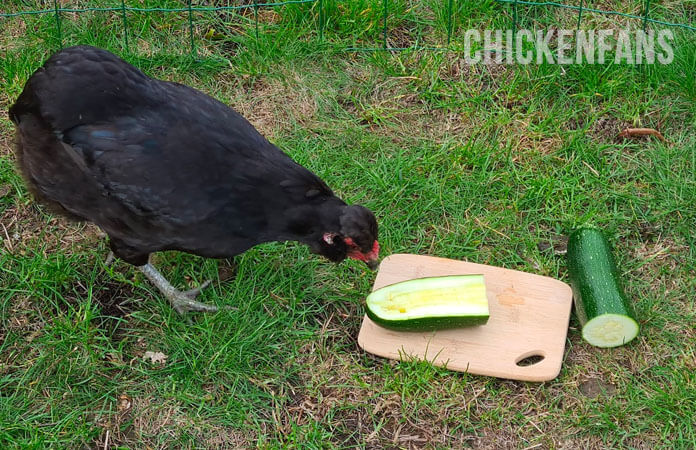
Health Benefits of Zucchini for Chickens
Zucchini comes with many health benefits for backyard chickens:
- It keeps the flock hydrated: water is also essential for digestion and for the organs to do their job. Chickens also require water to regulate their body temperature
- It helps them to cool down: the water, minerals, and electrolytes in zucchini allow chickens to cool down from heat stress
- Boosts the immune system: several antioxidants, and vitamin C, reduce oxidative stress and inflammation, both linked to several diseases and chronic illness
- Improves Digestion: the high fiber content in zucchini helps bowel movement and ‘good’ bacterial growth in the chicken’s guts
- May reduce blood sugars: research on animals suggests that the antioxidants in the flesh, fibers in the peels, and tocopherols in the seeds of zucchini reduce blood sugar levels
Most people classify zucchinis as vegetables, but botanically it’s actually a fruit. So it does comes with some sugars, albeit a very small amount. Most of the sugars in zucchini also have a very low glycemic index and do not raise the blood sugar levels of chickens much.
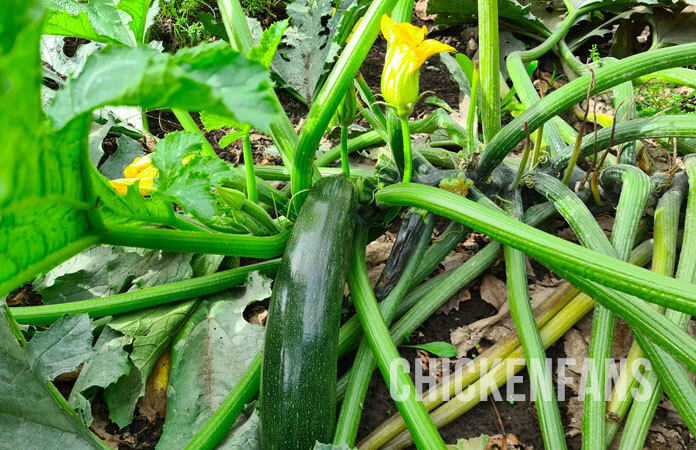
How many Zucchinis can Chickens Eat?
As a rule of thumb, chickens can eat zucchini in abundance. Especially in summer, it’s a wonderful treat to control the water balance in their body. However, healthy courgettes can’t replace regular food, so make sure they are still consuming enough of their regular feed.
Treats should generally be limited to about 5% of the feed intake. However, zucchinis are such a healthy food source it can be a little more. Your hens will be happy to help you out with the table scraps.
Can Chickens Eat Zucchini Squash Leaves?
Chickens can eat the big dark zucchini leaves of the squash plant. The leaves also contain vitamins A, B6, and C as well as many minerals such as zinc, iron, and potassium that will boost the chicken’s immune system. However, the leaves can be bitter, so not all chickens like them.
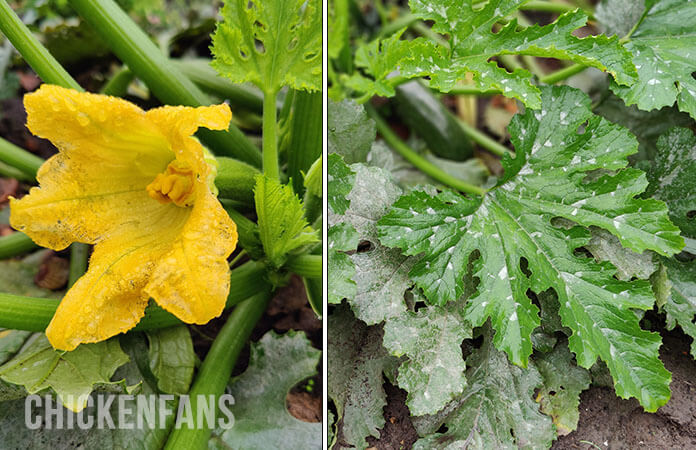
Can Chickens Eat Zucchini Squash Flowers?
Chickens can eat the edible yellow flowers of the zucchini plant. All parts of the blossom are edible and have a soft zucchini-like taste. The flowers are healthy and rich in vitamins A and C. However, never give chickens fried zucchini flowers (frying the flowers is popular in some cuisines).
When Not to Feed Zucchini to Chickens?
Avoid feeding your chickens when:
- the zucchini is rotten and damaged – only give your chickens courgettes that you would eat yourself. Avoid vegetables with yellow areas or over-ripe sunk-in spots.
- the zucchini has mold on it – molds are harmful to chickens, affect their digestive system, and can cause fungal infections.
- the zucchini is not properly washed – if you have store-bought courgettes, avoid feeding your chickens with any toxic pesticides harmful to the little birds
- you have long and thin zucchini blades – peeling sometimes results in long blades, and just like grass, these can get stuck in the chicken’s crop
- you have table scraps with harmful ingredients – if the zucchinis are part of a salad that contains less ideal ingredients, like mayonnaise, dressing, oils or ingredients like onions, don’t feed them to your chickens
If you want to learn more about chicken feed, please consult our ‘Chicken Food Page‘ to go and see every specific food article we address, including all articles on what chickens can and can not eat. Or go to our listicle food summary on ‘The Classroom‘.
Other Zucchini Questions
Yes, chickens can eat zucchini peels. The dark soft peels are rich in healthy carotenoids, powerful antioxidants that prevent diseases and boost the immune system. It’s also a precursor of vitamin A, which helps chickens see in dim light. The skin also comes with all the other healthy micronutrients of zucchinis.
Yes, chickens can eat zucchini seeds. They are the most nutrient-dense part and contain a lot of beta-carotene, a powerful antioxidant. The chicken’s body converts beta-carotene to vitamin A, which is vital for your chicken’s eye health and makes them see in shady environments.
Yes, chickens can eat yellow zucchini flesh and yellow zucchini seeds. Just like green zucchinis, they are a healthy food source rich in minerals and vitamins A, C, and B6. Zucchini can keep your chickens hydrated, boost their immune system, and helps your flock see in dim lights.
As a rule of thumb, every summer squash that’s edible for humans is safe for consumption by chickens. Chickens can eat marrow, straightneck squash, crookneck squash, zucchini, courgettes, scalop squash, pattypan squash, winter squash, aehobak, luffa, butternut squash, and pumpkins.
Related Zucchini Food Sources for Chickens
Zucchinis are typically part of salads:
- Chickens also love to eat cucumbers
- Avoid feeding onions to chickens if they are in a salad mix with zucchini
- When feeding tomatoes to chickens be aware that they contain tomatine, which is slightly toxic to chickens
There are some alternatives to zucchini squash to keep your chickens hydrated when it’s hot:
- Feeding watermelon can be another hydrating treat on hot summer days
- Feeding your hens small amounts of oranges can be a refreshing treat
